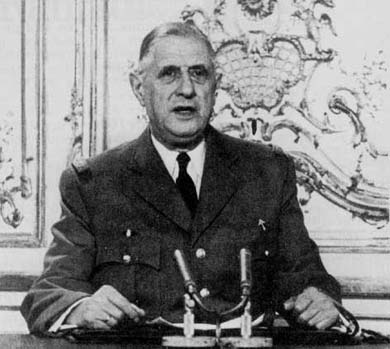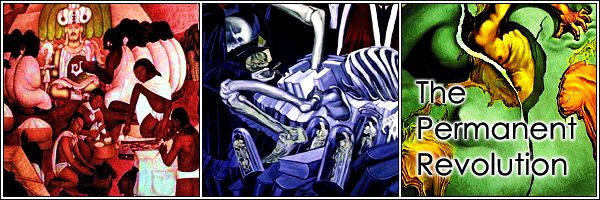"Punching" (response to Walt)
This is a long response to Stephen Walt's post on states punching above and below their weight. His post raises questions about the nature of a nation's power, its international influence, and the relationship between the two.
For this kind of exercise to be useful, one would need to define and be rigorous about what one means by 'national power', 'international influence' and so forth. The ability to get in the headlines is not the same thing as being influential.

President de Gaulle: power without influence.
In that sense, Charles de Gaulle is a rather misleading example. He obviously got a lot of attention at the time (and since) for his eloquent and bombastic rhetoric, and innovative, sometimes shocking, foreign policy. Arguably he increased France's power by making her autonomous within NATO through military withdrawal and the nuclear deterrent. However his influence over other countries seems to have been fairly close to nil. His efforts to seduce Germany (away from the Americans), to push the Poles to rebellion, to form a rapport with the Russians and neither were the Europeans willing to accept French leadership of the EEC with the Fouchet Plan. (One can only really cite his influence negatively: in blocking the UK's accession to the EEC, in vetoing the EEC for a while.)
Let us speak of *influence*, not notoriety. That is, we are talking about a state's ability to coerce, persuade or shape another state/region according to its desires. Here we find most countries becoming unexceptional, if not peripheral, to one another. Even informal spheres of influence today are rather rare, and whatever power a typical nation such as a Spain, an Argentina or a Malaysia has today, seems rather abstract. But let us explore this exercise..
Some conditions for punching above:
* Be the best in your region: This allows you to be the quasi-formal leader of your region in international fora. This applies mainly to Brazil and South Africa.
* Be powerful relative to your region: A related, but separate concept. Israel is tiny, of course, but its economic, technological and military prowess (not to mention the opposite qualities of its neighbors) give it a kind of dominance over its neighbors. Other examples of this could include Cuba (it used to have troops in various parts of Africa) and (Apartheid) South Africa.

The European Union: pooled power.
* Pool/join power: The best example of that is the EU. While it is obviously true the institution is a political fractious and a non-entity in any crisis, it also represents a sharing of economic power. Each EU member is economically too small to be of any real influence internationally (with the very slightly partial exception of Germany). EU membership negotiations are done in common, they offer the possibility of structural funds, agricultural funds, trade, aid, investment, and access to the European market. Naturally, the EU's neighbors greatly desire all these things, and the EU's member negotiate collectively to place *conditions* on access to it, the most important being democracy, the rule of law, market economics and so forth. In so doing, the small-to-medium sized EU states, each in themselves of little significance, are collectively using their substantial economic power to literally reshape their neighbors in accordance with their interest (in essence, making them peaceful, prosperous, democratic trading states).
Some conditions for punching below:

Happy irrevelevance... (Switzerland)
* Having a weak military-industrial complex and foreign policy/national security elites. This is the case of civilianized 'trading states', Japan and Western Europe (partial exceptions of Britain/France) being the typical examples. With military spending at circa 1% of GDP, the ability to project military power is almost nil, making one impotent in crisis situations requiring it (1990-1 Gulf War, Yugoslav Wars, for example).

...miserable strength. (Soviet soldiers in Prague, 1968)
* Have a too strong (or foolishly used) military-industrial complex and foreign policy/national security elites. Military power today is a double edged sword, and I would argue, not that useful in most instances. Globalization and nuclear weapons have meant that fighting first world countries is both useless and suicidal. Demographic explosion and asymmetric weapons (IEDs, Kalashnikov etc.) have made 3rd world occupation mostly pointless. The typical example of this was the Soviet Union, having vast armed forces, a huge nuclear arsenal, an economy distorted by 15-20% of GDP sucked into defense. Meanwhile, this military power was either A) unused B) used to control an impoverished, expensive, embarrassing and strategically useless Eastern Europe, and the threat it posed precluded much Soviet cooperation with the only places that mattered in terms of trade, aid and technological development: North America, Western Europe and Japan.
Still, this is all very schematic. One would really need appropriate and rigorous definitions. 'National power' seems easy enough, tally up the numbers in terms of GDP, soldiers, nuclear weapons, tanks, trade and so forth. 'Influence' and 'international power' seem much more difficult. Power is often structural and not related to executive leadership (the democratic/capitalistic/pacifying influence of German trade on its neighbors for instance). Power is also often conditional on a (usually problematic) situation for it to be useful. Without Saddam Hussein's invasion of Kuwait in 1990, for instance, it is doubtful US military power would have seen any 'useful' action since the end of the Cold War. Finally, 'power' can't be judged as a simple number (nation X is 10x stronger than nation Y).

Power and Peril: military adventurism
Power is double edged, particularly military power. Germany's influence abroad is constrained by its low military tradition and aversion to intervention. But does vast military capabilities really make a nation internationally powerful? As always, it depends. Military power is useful in some instances, but it also has an intoxicating effect on elites, leading them to military adventures that are extremely costly to the nation in terms of blood and treasure, while not increasing the country's international influence, in fact, often the opposite. The examples are infinite: French Indochina, French Algeria, the U.S. in Vietnam and Iraq, the Soviets and Americans in Afghanistan to cite the most modern examples. As they say, when you have a hammer..
For this kind of exercise to be useful, one would need to define and be rigorous about what one means by 'national power', 'international influence' and so forth. The ability to get in the headlines is not the same thing as being influential.

President de Gaulle: power without influence.
In that sense, Charles de Gaulle is a rather misleading example. He obviously got a lot of attention at the time (and since) for his eloquent and bombastic rhetoric, and innovative, sometimes shocking, foreign policy. Arguably he increased France's power by making her autonomous within NATO through military withdrawal and the nuclear deterrent. However his influence over other countries seems to have been fairly close to nil. His efforts to seduce Germany (away from the Americans), to push the Poles to rebellion, to form a rapport with the Russians and neither were the Europeans willing to accept French leadership of the EEC with the Fouchet Plan. (One can only really cite his influence negatively: in blocking the UK's accession to the EEC, in vetoing the EEC for a while.)
Let us speak of *influence*, not notoriety. That is, we are talking about a state's ability to coerce, persuade or shape another state/region according to its desires. Here we find most countries becoming unexceptional, if not peripheral, to one another. Even informal spheres of influence today are rather rare, and whatever power a typical nation such as a Spain, an Argentina or a Malaysia has today, seems rather abstract. But let us explore this exercise..
Some conditions for punching above:
* Be the best in your region: This allows you to be the quasi-formal leader of your region in international fora. This applies mainly to Brazil and South Africa.
* Be powerful relative to your region: A related, but separate concept. Israel is tiny, of course, but its economic, technological and military prowess (not to mention the opposite qualities of its neighbors) give it a kind of dominance over its neighbors. Other examples of this could include Cuba (it used to have troops in various parts of Africa) and (Apartheid) South Africa.

The European Union: pooled power.
* Pool/join power: The best example of that is the EU. While it is obviously true the institution is a political fractious and a non-entity in any crisis, it also represents a sharing of economic power. Each EU member is economically too small to be of any real influence internationally (with the very slightly partial exception of Germany). EU membership negotiations are done in common, they offer the possibility of structural funds, agricultural funds, trade, aid, investment, and access to the European market. Naturally, the EU's neighbors greatly desire all these things, and the EU's member negotiate collectively to place *conditions* on access to it, the most important being democracy, the rule of law, market economics and so forth. In so doing, the small-to-medium sized EU states, each in themselves of little significance, are collectively using their substantial economic power to literally reshape their neighbors in accordance with their interest (in essence, making them peaceful, prosperous, democratic trading states).
Some conditions for punching below:

Happy irrevelevance... (Switzerland)
* Having a weak military-industrial complex and foreign policy/national security elites. This is the case of civilianized 'trading states', Japan and Western Europe (partial exceptions of Britain/France) being the typical examples. With military spending at circa 1% of GDP, the ability to project military power is almost nil, making one impotent in crisis situations requiring it (1990-1 Gulf War, Yugoslav Wars, for example).

...miserable strength. (Soviet soldiers in Prague, 1968)
* Have a too strong (or foolishly used) military-industrial complex and foreign policy/national security elites. Military power today is a double edged sword, and I would argue, not that useful in most instances. Globalization and nuclear weapons have meant that fighting first world countries is both useless and suicidal. Demographic explosion and asymmetric weapons (IEDs, Kalashnikov etc.) have made 3rd world occupation mostly pointless. The typical example of this was the Soviet Union, having vast armed forces, a huge nuclear arsenal, an economy distorted by 15-20% of GDP sucked into defense. Meanwhile, this military power was either A) unused B) used to control an impoverished, expensive, embarrassing and strategically useless Eastern Europe, and the threat it posed precluded much Soviet cooperation with the only places that mattered in terms of trade, aid and technological development: North America, Western Europe and Japan.
Still, this is all very schematic. One would really need appropriate and rigorous definitions. 'National power' seems easy enough, tally up the numbers in terms of GDP, soldiers, nuclear weapons, tanks, trade and so forth. 'Influence' and 'international power' seem much more difficult. Power is often structural and not related to executive leadership (the democratic/capitalistic/pacifying influence of German trade on its neighbors for instance). Power is also often conditional on a (usually problematic) situation for it to be useful. Without Saddam Hussein's invasion of Kuwait in 1990, for instance, it is doubtful US military power would have seen any 'useful' action since the end of the Cold War. Finally, 'power' can't be judged as a simple number (nation X is 10x stronger than nation Y).

Power and Peril: military adventurism
Power is double edged, particularly military power. Germany's influence abroad is constrained by its low military tradition and aversion to intervention. But does vast military capabilities really make a nation internationally powerful? As always, it depends. Military power is useful in some instances, but it also has an intoxicating effect on elites, leading them to military adventures that are extremely costly to the nation in terms of blood and treasure, while not increasing the country's international influence, in fact, often the opposite. The examples are infinite: French Indochina, French Algeria, the U.S. in Vietnam and Iraq, the Soviets and Americans in Afghanistan to cite the most modern examples. As they say, when you have a hammer..
Labels: military, power, Stephen Walt



2 Comments:
Hey, Grey, great article and I'm glad that you started to blog.
Sorry I wrote Grey instead of Craig,
Post a Comment
<< Home